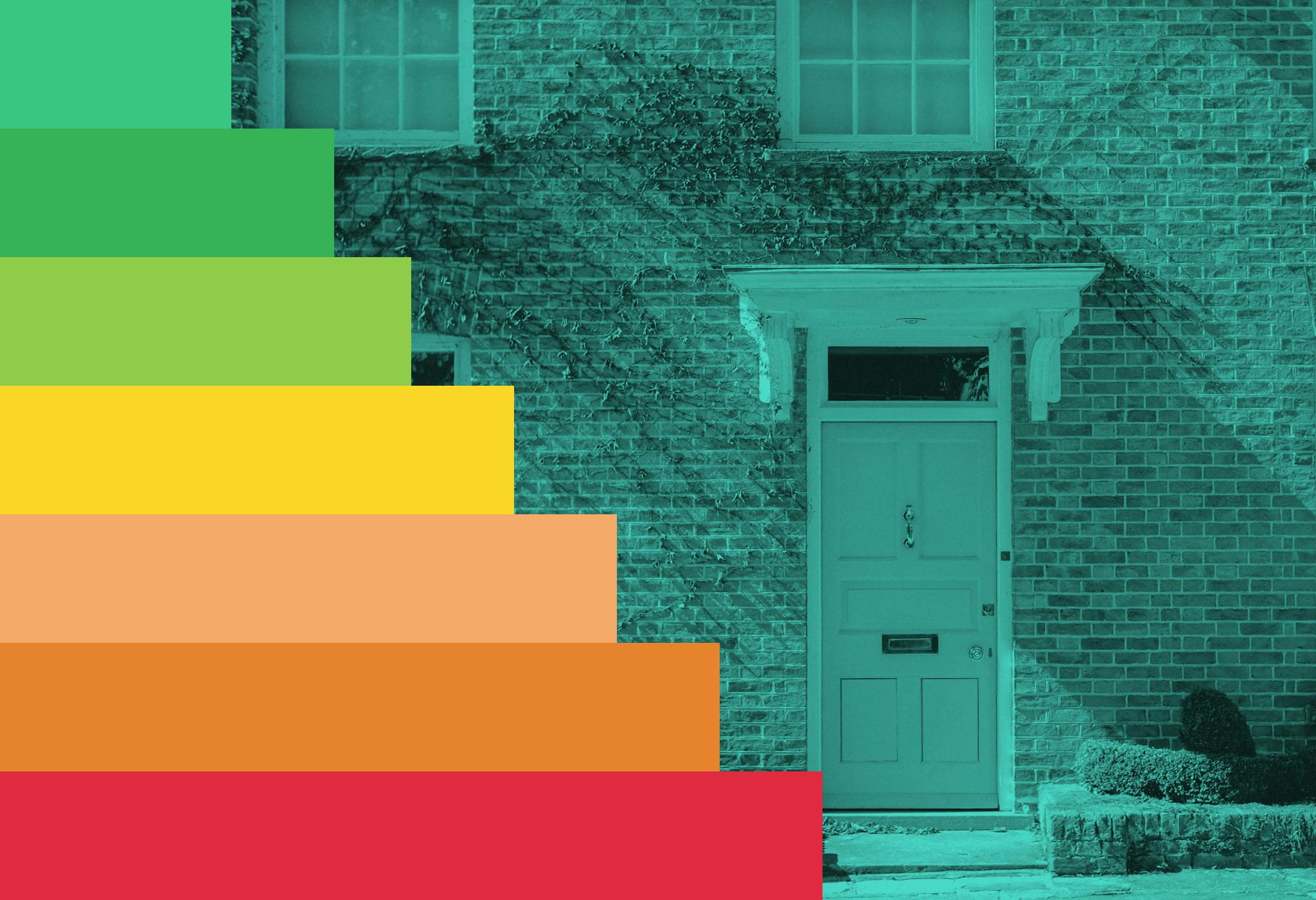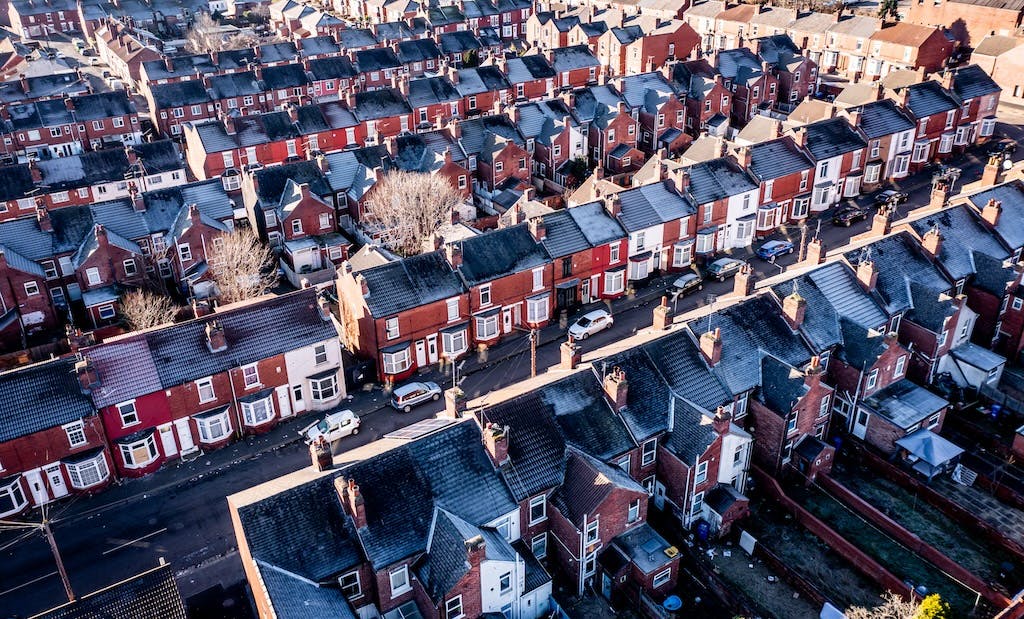The 11 best ways to improve your home’s EPC rating
Discover 11 of the best ways to improve your home's EPC rating, from insulation and better boilers to new lightbulbs and solar panels.
Written byMelody Abeni

Improving your EPC: at a glance
🏠 The average EPC rating for properties in the UK is a D
👨🏻🔧 Each property's score is determined by a physical inspection
🔥 Your home’s heating system has the biggest impact on your EPC rating
☀️ Solar panels are a great way to cut your energy bills and boost your EPC
🍃 A higher EPC rating can unlock green mortgages with better interest rates
The vast majority of UK properties require an Energy Performance Certificate (EPC), meaning your home will almost certainly have one, even if you don’t know what it is.
Cutting your energy bills and improving your property’s EPC rating are very closely connected - if you do one, the other is likely to follow. Plus, when it’s time to sell, a property with a higher EPC rating could fetch a better price.
In this article, we run through the 11 best ways to improve your home’s EPC rating, ranging from insulation and better lightbulbs to (spoiler alert) solar panels.
If you’d like to find out how much a solar & battery system could save you, simply provide a few quick details below and we’ll provide you with an estimate.
What is an EPC rating?
An EPC rating is a way of measuring your home’s energy efficiency, which refers to how much energy it takes to heat and power your home, and how much is wasted in the process.
It’s done on a scale of A to G, with A being the highest possible level of efficiency and G being the lowest. Since A-rated properties consume far less energy to maintain a comfortable temperature than G-rated properties, their energy bills are considerably lower.
The A-G scale uses colour coding to give homeowners a clear and easily understandable picture of their home's efficiency. Unsurprisingly, bright red is the worst and bright green is the best.
An assessor must physically inspect your home to calculate your home's EPC. So if this hasn’t happened since you moved into your property, it probably will have happened some time before. You can check your property’s EPC rating here.
On the day, the assessor will inspect your property’s energy usage and heat loss, taking into account things like:
- The age and size of your property
- Whether it has any wall or loft insulation
- Whether it has double glazing
- The efficiency of your home-heating system
- Whether you have any renewable sources of electricity (like solar panels)
Once done, the assessor will use the Standard Assessment Procedure (SAP) methodology introduced by the government to score the inspection. Then, they'll convert this score into an EPC grade.
Here’s how many points each of the EPC bands count for:
| SAP points | EPC rating |
|---|---|
| 92-100 | A |
| 81-91 | B |
| 69-80 | C |
| 55-68 | D |
| 39-54 | E |
| 21-38 | F |
| 1-20 | G |
What is a good EPC rating?
Certainly by UK standards, a ‘good’ EPC rating is anything that exceeds a D, given that the median score for UK properties is around 67-68, according to the ONS.
A 2022 study by Tado found that British housing stock is among the worst insulated in Europe, which contributes to higher energy consumption and costs.
What’s more, around 1.7 million homes are physically unable to reach above C, according to research by Rightmove.
However, it’s a better story for newer homes; properties built after 2012 are considerably more energy-efficient, boasting an average EPC score of 84, which equates to band B.

What are the best ways to improve your EPC rating?
Improving your EPC rating can feel like a daunting task, especially since the most impactful upgrades often come with a hefty price tag.
Jumping from an E to a C rating is a massive leap that comes with solid benefits (more on that later). However, there are also smaller, more affordable changes that can still make a noticeable difference.
Here are our top 11 ways to boost your property's energy efficiency and improve its EPC rating:
1. Insulate your loft
According to the Energy Saving Trust, uninsulated homes can lose up to 25% of their heat through the roof. Loft insulation creates a barrier that significantly reduces heat loss, saving you hundreds per year on energy bills and keeping your home warmer for longer.
As one of the most effective ways to boost your home's energy efficiency, loft insulation can potentially add around 10 to 16 points to your EPC rating, depending on the specific insulation material you use and its depth.
While fibreglass and renewable wood fibre are popular insulation materials, they’re not your only options. You could also choose sheep’s wool, mineral wool, or recycled materials, depending on your budget and how environmentally friendly you want to be.
Plus, loft insulation is pretty simple to install yourself, so many homeowners choose to do it as a DIY project. In many cases, you just need to place the insulation between the rafters that support your roof.
2. Upgrade your boiler
Another significant part of your home's EPC calculation is your heating system, and an old, inefficient boiler can significantly drag your score down.
Boilers with the lowest ErP and SEDBUK ratings (the main efficiency standards for boilers) are less than 70% efficient, and so can waste over 30% of the energy they use.
A change to UK regulations in 2007 made it compulsory for all new boilers to have modern ‘condensing’ technology, which makes them significantly more efficient (usually at least 90%) - so upgrading to a new boiler can make a dramatic difference to your heating bills.
But it’s usually a hefty outlay; on average, replacing an old gas boiler costs around £3,700, according to the Energy Saving Trust.
3. Get double glazing
If you’re among the 15% of UK homes without double glazing, you could be losing up to 18% of your home's heat through your windows. Getting double glazing will add around five to 10 points to your home’s EPC rating and make your home more insulated.
You’ll also reduce the amount of outside noise making its way into your home, which is great if you live on a busy street.
However, double glazing isn't the cheapest way to improve your EPC rating. Replacing all the windows in a three-bedroom home usually costs between £8,000 to £15,000, depending on the size and type of windows you choose, according to Checkatrade.
Although this is a substantial investment, it could potentially save you as much as £150 per year on energy costs.

4. Switch to solar power
Solar panels increase a home’s EPC rating by around 18 points on average, according to our calculations, which are based on the government’s Standard Assessment Procedure (SAP) guidance.
EPC reports will usually tell you that a 2.5kWp solar panel system could increase your score by around 10 points, but the average domestic solar installation is now above 4.6kWp (MCS data dashboard, March 2025) – hence the extra uplift.
However, solar panels come with a high upfront cost; the average cost of a 3kWp solar panel system for a typical property with two or three bedrooms is about £9,000, including installation. This jumps up to around £11,000 if you’re adding a 5kWh battery.
If you’d like to get solar panels but you’re put off by the high upfront cost, consider Sunsave Plus. This is the UK’s first solar subscription, and it means you can switch to solar with no upfront cost, and instead pay a fixed monthly fee.
Your system will also be protected by the Sunsave Guarantee for the full term, which includes 24/7 monitoring and maintenance, free replacement parts, downtime cover, and insurance.
Wondering how much a solar & battery system could save you? Pop a few quick details into the form below and we’ll provide you with an estimate.
5. Buy efficient light bulbs
Replacing your older incandescent light bulbs with halogen bulbs, LED bulbs, or compact fluorescent bulbs is a cheap and easy way to score a few extra points on your EPC rating.
Usually you’ll spend anywhere from £2 to £6 per 12 watt (W) LED light bulb, which is more than the £1 you’ll spend on an incandescent bulb, but it’s worth paying the extra.
An LED light bulb will last at least 10,000 hours over 10 years, on average, compared to an incandescent bulb’s typical lifespan of 2,000 hours over two years.
LED bulbs are cheaper to run too, saving you roughly £2-3 per bulb per year - or around about £40 a year for a typical three-bedroom UK home, according to the Energy Saving Trust.
6. Use a smart thermostat
Smart heating controls are something every EPC assessor checks for when they inspect your property. But EPC aside, a smart thermostat could save you up to £110 a year on your bills, according to the Energy Saving Trust.
Using a smart thermostat allows you to heat your home more efficiently, as you can control the temperature in individual rooms instead of just heating the whole house.
Some smart thermostats, like Hive, can even sync with your phone’s GPS, meaning they’ll turn off the heating when they detect you’re away from home (and then switch it back on when you’re getting near).
Smart thermostats usually require a new energy-efficient boiler to work properly and cost between £120 and £220 plus installation, depending on your choice of brand and model.
7. Wrap up your hot water cylinder
A hot water cylinder is a tank that stores hot water for your home, typically used in properties with a system boiler or an immersion heater. If your cylinder isn’t properly insulated, it can lose heat quickly, making your heating system work harder and so waste energy in the process.
By putting a specially designed ‘jacket’ on your hot water cylinder, you can reduce heat loss, keeping the water warmer for longer and reducing the need to reheat it. Even if your cylinder already has some insulation (like a foam coating), a jacket adds extra protection and cuts down on heat loss.
These easy-to-install jackets typically cost around £18-25, depending on the size and brand, and can save you up to £40 per year on energy bills - meaning it can pay for itself in just a few months.
8. Insulate your walls
Like loft insulation, insulating your walls is a fantastic way to bump up your EPC rating. However, getting wall insulation is considerably more expensive than loft insulation.
There are two main types of wall insulation: cavity wall insulation and solid wall insulation.
Cavity wall insulation involves filling the gap between two layers of brickwork with materials like mineral wool, polystyrene beads, or foam. It’s a relatively straightforward process and costs around £2,700 for a typical three-bedroom semi-detached home, according to Checkatrade.
Solid wall insulation, on the other hand, is significantly more expensive, costing closer to £11,000 for a semi-detached house. It involves adding insulation either internally or externally using materials like rigid foam boards or insulating plaster.
Unless you're an expert, it's best not to attempt a DIY wall insulation project, as it needs specialist equipment and knowledge. Otherwise, you could end up with issues like damp or structural damage.
9. Add underfloor heating
Underfloor heating is a highly efficient way to heat your home when combined with good insulation.
Unlike traditional radiators, which heat the air around them, underfloor heating works by evenly distributing heat across your floor’s surface. The heat then warms the whole room, from the ground up, evenly and comfortably.
There are two main types of underfloor heating: water-based (wet) systems and electric (dry) systems.
Water-based systems circulate warm water through pipes beneath the floor and are the most efficient option for long-term use. But they're more expensive to retrofit, costing around £95-£110 per square metre.
Electric systems use heating cables or mats and are cheaper to retrofit at £60-£85 per square metre - but they're less efficient and cost more to run overall.
10. Seal any draughts
Sealing draughts in windows and buying a draught excluder for your door can lead to quick wins for your overall EPC score.
These are cheap solutions, too - silicon sealant for windows costs just £6-£12 and you can purchase a draught excluder cushion for around £10-£15.
Alternatively, if you don’t trust the DIY approach then you can spend around £250 to have your home professionally draught-proofed.
11. Upgrade any old appliances
While replacing old or faulty appliances won’t drastically increase your EPC score on its own, it’s still a useful step toward improving your home’s energy efficiency.
Appliances like fridges, washing machines, and dishwashers are rated on an energy efficiency scale from A to G (just like EPC grades for properties), with A-rated models being the most efficient.
Think of fridge freezers, which run 24/7 and use a fair amount of energy. Upgrading an old, E-rated fridge freezer to an A-rated one can save you up to £360 over its lifespan.
What are the benefits of improving your EPC rating?
Improving your EPC rating comes with a host of benefits, from lower energy bills and a reduced carbon footprint to a more comfortable home, with warmer winters and cooler summers - especially if upgrades include insulation or double glazing.
It can also boost your property’s value and give you access to green mortgages, which offer lower interest rates and cash rewards for more energy-efficient homes.
Cheaper energy bills
One of the biggest benefits of improving your EPC rating is significantly lower energy bills. A 2024 report from Rightmove shows how homes with an F rating face average annual energy costs of £4,312, compared to just £1,681 for homes rated C - a staggering difference of £2,631.
Reduced carbon footprint
Improving your EPC rating directly reduces your home’s carbon footprint by lowering the amount of energy needed to heat, cool, and power your property. Efficiency upgrades, like better insulation or modern heating systems, reduce energy waste and greenhouse gas emissions.
In fact, 22% of respondents in the above survey said they’ve made - or are considering - green home improvements specifically to reduce their carbon footprint.
Potential increased property value
Investing in your property’s energy efficiency not only saves on bills but can also boost your home’s market appeal.
Rightmove's 2023 study of 300,000 homes shows how your EPC rating directly affects your home's value. It found that a home moving from an F rating to a C rating could increase its value by 15%, on average, or “almost £56,000 when looking at the current national average asking price.”
Access to green mortgages
A higher EPC rating can unlock green mortgages, which offer better interest rates and make remortgaging cheaper.
Some green mortgages also provide cash rewards, like the Barclays Greener Home Reward, which gives eligible mortgage customers up to £2,000 to fund energy efficiency improvements without needing additional borrowing.
To learn more, check out our detailed guide to green mortgages and green home rewards.
Next steps
We've explored several practical ways you can improve your home's EPC rating, lower your bills and potentially boost your home's value.
One of the best ways to increase your score is by installing solar panels, which also bring many other benefits in the long run - including preparing your home for the UK’s electrified future.
If you’d like to find out how much a solar & battery system could save you, just provide a few quick details below and we’ll give you an estimate.
Improving your EPC: FAQs
What improves a property's EPC rating?
Improving your home’s EPC rating involves making it more energy-efficient and reducing energy waste.
Key steps include adding insulation, upgrading to energy-efficient appliances, improving your heating system, installing double glazing, and switching to renewable energy sources like solar panels.
How can I improve my SAP rating?
SAP (Standard Assessment Procedure) is a methodology used by the UK government to assess and compare the energy and environmental performance of dwellings. Your property’s SAP score directly determines its EPC rating.
Does double glazing improve EPC?
Yes, installing double glazing can improve your EPC rating by around five to 10 points. Double-glazed windows reduce heat loss by up to 18%, making your home more energy-efficient and insulated.
The upfront cost for a three-bedroom home is steep - usually around £8,000-£15,000 - but you'll save significantly on energy bills and enjoy greater comfort thanks to reduced heat loss and noise.
What is the lowest acceptable EPC rating?
If you're a landlord, your property must meet an EPC rating of at least an E, otherwise you can't rent it out - according to the Domestic Minimum Energy Efficiency Standard (MEES) Regulations.
In December 2024, the UK government also proposed that rental properties will need a minimum EPC rating of C by 2030, with all new tenancies to meet the standard by 2028.
If you are buying a home for yourself, it's also important to be aware that a home's EPC rating can be factored into mortgage lending decisions. Lenders can refuse an application if they deem a rating to be too low, with little room for improvement.

Written byMelody Abeni
Based in London, Melody is a specialist green technology writer who has been covering sustainability, climate action and ESG for the past five years, after gathering operational experience in green investing and financial services. She has written for various industry publications, including renewable technology advisor The Eco Experts, and she holds a Master’s degree in law from Birkbeck University.